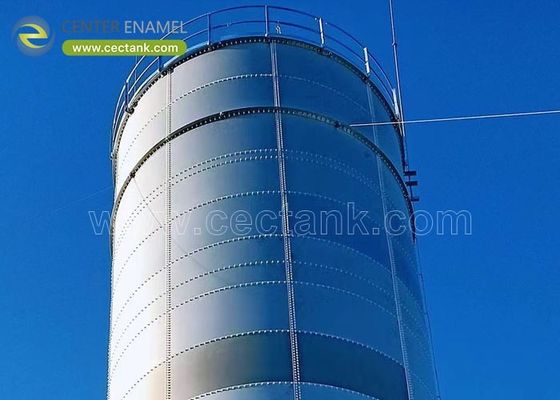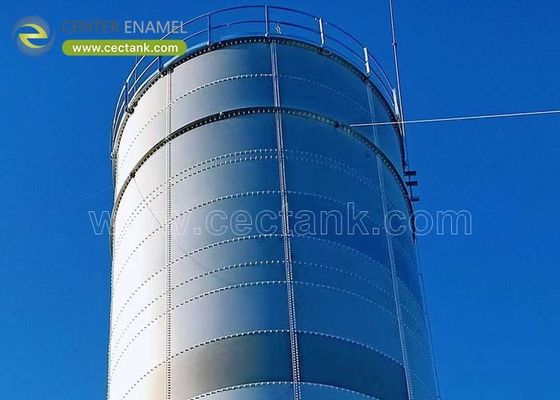-
Glass Fused To Steel Tanks (465)
-
Stainless Steel Tanks (434)
-
Fusion Bonded Epoxy Tanks (469)
-
Galvanized Steel Tanks (321)
-
Aluminum Dome Roofs (1257)
-
Wastewater Storage Tanks (226)
-
Welded Steel Tanks (457)
-
Pressure Vessels (295)
-
Anaerobic Digester (201)
-
Industrial Water Tanks (349)
-
Glass Lined Steel Tanks (180)
-
Bolted Steel Tanks (270)
-
Sludge Storage Tank (115)
-
Biogas Storage Tank (173)
-
Leachate Storage Tanks (133)
-
Agricultural Water Storage Tanks (179)
-
Fire Water Tank (166)
-
Grain Storage Silos (146)
-
Biogas Projects (381)
-
Wastewater Treatment Projects (270)
-
Double Membrane Roof (223)
Stainless Steel Tanks for Agricultural Grain Storage: Durability, Hygiene, and Long‑Term Value
| Place of Origin: | China |
| Brand Name: | CEC TANKS |
| Certification: | ISO 9001:2008, AWWA D103 , OSHA , BSCI |
| Model Number: | W |
| Minimum Order Quantity: | 1set |
| Price: | $5000~$20000 one set |
| Packaging Details: | PE poly-foam between each two steel plates ; wooden pallet and wooden |
| Delivery Time: | 10-30 days after deposit received |
| Payment Terms: | L/C, T/T |
| Supply Ability: | 60 sets per month |
|
Detail Information |
|||
Product Description
Stainless Steel Tanks for Agricultural Grain Storage: Durability, Hygiene, and Long‑Term Value
In modern agriculture, the way grain is stored after harvest can determine both yield integrity and market value. Stainless steel tanks from Center Enamel offer a robust storage solution designed to protect grain from moisture, pests, and contamination while delivering long-term cost efficiency. With proven corrosion resistance, airtight construction, and scalable capacity, stainless steel storage tanks are well suited for farms, cooperatives, and commercial grain handlers seeking reliability, hygiene, and operational simplicity.
Why stainless steel for grain storage?
Stainless steel combines strength, corrosion resistance, and hygienic performance that few other materials can match. Key advantages include:
- Hygiene and purity: A smooth, non-porous surface resists bacterial growth and mold formation, making stainless steel ideal for food-grade storage and reducing the risk of contamination during handling and transfer. The inert nature of stainless steel minimizes leaching, helping preserve grain quality over time.
- Corrosion resistance: The chromium content in stainless steel forms a passive oxide layer that self‑repairs after exposure to moisture and weather fluctuations. This is critical for outdoor installations or facilities with variable humidity, extending the life of the tank and lowering maintenance costs.
- Airtight integrity: Precision bolted designs and high-performance gaskets create airtight enclosures that limit moisture ingress and condensation, a common threat to stored grain. An airtight environment helps maintain moisture control, which in turn protects against fungal growth and spoilage.
- Structural robustness: High-grade stainless steel panels and frames deliver the strength needed to contain large grain volumes and withstand environmental stresses, including wind loads and seismic considerations in certain regions.
- Cleanability and sanitation: Surfaces are easy to clean and sanitize, reducing downtime between batches and enabling routine QA checks without heavy labor or specialized equipment.
- Low lifecycle costs: Although the upfront investment may be higher than some alternatives, the durability and minimal maintenance of stainless steel tanks translate into lower total cost of ownership over decades.
Center Enamel’s stainless steel tank portfolio for grain storage
Center Enamel offers a range of stainless steel tanks designed to meet diverse grain storage needs, including:
- Large-volume silos for farm-to-processor supply chains: Engineered to handle hundreds to thousands of cubic meters, these tanks optimize storage density without compromising accessibility for cleaning and maintenance.
- Hygienic grain silos with streamlined cleaning access: Features such as removable ladders, manways, and clean-out ports facilitate rapid sanitation cycles and compliance with food safety standards.
- Bolted construction with sealed joints: Bolted designs enable rapid on-site assembly with consistent airtight seals, reducing installation time and enabling modular expansions as demand grows.
- Optional accessories for process control: Integrated ventilation controls, hopper designs, level indicators, temperature monitoring, and pest-proof ingress protections help maintain grain quality across varying storage periods.
Design considerations for grain storage tanks
To maximize performance and longevity, Center Enamel’s stainless steel tanks are engineered around several critical design considerations:
- Material grade and finish: An appropriate stainless steel grade (e.g., 304 or 316) and a sanitary, easy-to-clean finish are selected to resist corrosion and facilitate routine sanitation.
- Sealing and gaskets: High-quality, food-grade gaskets and precision seam fabrication minimize air and moisture leaks, preserving conditions inside the tank.
- Ventilation control: Controlled aeration and venting systems maintain uniform moisture and temperature profiles, preventing hotspots, condensation, and mold risk.
- Insulation options: For climates with wide temperature swings, insulation packages help stabilize internal conditions, reducing energy use and preserving grain quality.
- Access and cleaning: Strategically placed access ports, manways, and cleanout doors enable efficient batch turnover without compromising structural integrity.
- Structural strength: Reinforced frames and corrosion-resistant fasteners ensure longevity under heavy grain loads and dynamic loading during filling and emptying.
- Mobility and installation: For operations needing relocation or reconfiguration, modular bolt-together designs simplify assembly, disassembly, and transport.
Operational benefits of stainless steel grain tanks
- Grain quality protection: Stainless steel’s inert surface, combined with airtight seals, helps prevent chemical reactions, cross-contamination, and spoilage, preserving germination rates and nutritional value.
- Pest and moisture management: Airtight enclosures deter pest intrusion and moisture ingress, two major drivers of grain loss in storage.
- Temperature and humidity control: With appropriate ventilation and insulation, thermal management minimizes moisture migration and temperature-driven degradation.
- Easier sanitation: Rapid cleaning reduces downtime between storage cycles and helps meet food safety and biosecurity requirements.
- Compliance and traceability: Stainless steel storage supports hygienic standards and traceability initiatives, aiding in audits and certification processes.
Quality assurance and safety considerations
- Hygiene protocols: Routine cleaning and sanitation schedules ensure grain remains within safe specifications for moisture, temperature, and absence of contaminants.
- Structural inspections: Regular checks on seals, gaskets, bolts, and welds prevent progressive deterioration and maintain airtight performance.
- Corrosion monitoring: Visual inspections and, where appropriate, non-destructive testing help identify early signs of wear or exposure to aggressive conditions.
- Compliance with standards: Center Enamel’s stainless steel tanks are designed to align with international food-grade storage standards and industry best practices to support export readiness and cross-border trade.
Installation and commissioning
- Site preparation: A level, stable foundation is essential to ensure load distribution and tank alignment for airtight sealing.
- Assembly: Bolted construction enables rapid on-site assembly with minimal specialized labor, reducing installation time and downtime.
- Commissioning: Initial checks include seal integrity tests, ventilation calibration, load testing, and verification of cleaning ports and access points.
- Training and handover: Comprehensive operator training covers startup, daily operation, sanitation, and routine maintenance to maximize performance.
Case for investment: total cost of ownership
- Upfront investment versus long-term savings: While stainless steel tanks may require higher initial capital, longer service life, reduced maintenance, and lower contamination risk translate into a favorable total cost of ownership.
- Downtime reduction: Fast installation and straightforward cleaning workflows minimize downtime between storage cycles, boosting overall productivity.
- Scalability: Modular, bolted designs support phased capacity increases as demand grows, protecting capital investment while enabling flexible expansion.
- Asset value retention: Stainless steel storage maintains higher residual value over time due to corrosion resistance and favorable sanitation credentials.
Maintenance best practices
- Cleaning cycles: Establish regular cleaning routines using approved sanitizers that do not corrode stainless surfaces.
- Inspection schedules: Implement quarterly inspections of seals, gaskets, bolts, and fasteners; conduct more frequent checks in damp or coastal environments.
- Ventilation management: Maintain ventilation systems to balance humidity and prevent condensation; monitor temperature and airflow where applicable.
- Documentation: Keep logs for cleaning, inspections, and any maintenance work to support traceability and regulatory compliance.
- Refurbishment options: When capacity needs evolve, consider re-purposing or refurbishing existing tanks rather than replacing them, leveraging the modular design.
The Center Enamel value proposition
Center Enamel provides stainless steel grain storage tanks designed to deliver reliability, hygiene, and long-term cost efficiency for agricultural operations. With decades of market experience, Center Enamel combines robust bolted construction, superior corrosion resistance, and tailored solutions to meet diverse environmental conditions and storage requirements. Each tank is engineered for ease of maintenance, optimized for grain quality preservation, and compatible with existing processing and handling workflows.
Why choose Center Enamel for grain storage?
- Proven expertise in bolted storage solutions and stainless steel construction.
- Customizable configurations to fit farm, cooperative, or industrial-scale operations.
- Focus on food-grade hygiene, airtight performance, and long service life.
- Comprehensive after-sales support, including installation, training, and maintenance guidance.
Stainless steel tanks from Center Enamel represent a forward-looking solution for agricultural grain storage. By combining hygienic, corrosion-resistant surfaces with airtight integrity and modular design, these tanks safeguard grain quality, reduce loss, and deliver significant long-term value. Whether protecting high-volume harvests or enabling compact, efficient on-farm storage, Center Enamel’s stainless steel storage tanks offer a dependable foundation for modern grain handling and food safety compliance.




